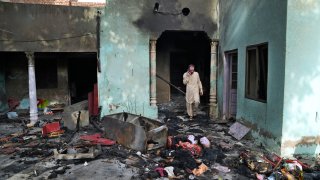
Police in eastern Pakistan arrested 129 Muslims overnight after a Muslim mob angered over an alleged desecration of the Quran attacked churches and homes of minority Christians, prompting authorities to summon soldiers to restore order, officials said Thursday.
The Christians living in the city of Jaranwala in the Faisalabad district quickly moved to safer places as the mob rampaged Wednesday, and there were no casualties from what was one of the country's most destructive attacks against Christians.
They slowly returned home to see the destruction Thursday. At least one church was burned, four were damaged and two dozen homes were torched or badly damaged.
“We were sitting at home when suddenly we heard that a mob is coming and it is burning homes and attacking churches,” Shazia Amjad said as she wept outside her torched home.
Get DFW local news, weather forecasts and entertainment stories to your inbox. Sign up for NBC DFW newsletters.
She told The Associated Press that the mob burned household items and furniture and some of her possessions were stolen while she was staying with her family in a safer place.
Amjad said the rioters sprinkled petrol to burn homes. Other Christians described similar ordeals and expressed bewilderment.
Azeem Masih wept as he sat outside his burned home on a street where several were burned.
U.S. & World
He said some of the rioters brought vehicles to take the Christians' household items after burning their furniture and other belongings. “Why did they do it to us? We had not done anything wrong,” he said.
Local Christians consoled each other outside their damaged homes, wept and cried, and those who lost their homes had no idea where to go or what to do now.
Local priest Khalid Mukhtar told AP earlier he believed most of Jaranwala's 17 churches had been attacked and his own home was damaged.
Delegations of Muslim clerics arrived in Jaranwala to help calm the situation, as troops and police patrolled the area. Local authorities have shut schools and offices and banned rallies for a week to prevent more violence.
The violence drew nationwide condemnation, with caretaker Prime Minister Anwaarul-ul-Haq Kakar ordering police to ensure the rioters are arrested.
On Thursday, Rizwan Khan, the regional police chief, said 129 suspects had been arrested and the situation was under control.
The rampage started after some local Muslims claimed they had seen a local Christian, Raja Amir, and his friend tearing out pages from a Quran, throwing them on the ground and writing insulting remarks on other pages.
Police say they are trying to arrest Amir, who fled into hiding, to determine whether he desecrated Islam’s holy book.
According to Khan, the mob quickly gathered and began attacking multiple churches and several Christian homes. The rioters also attacked the offices of a city administrator on Wednesday, but police eventually intervened, firing into the air and wielding batons to disperse rioters with the help of Muslim clerics and elders.
Videos and photos posted on social media show an angry mob descending upon a church, throwing pieces of bricks and burning them. In another video, four other churches are attacked, their windows broken as attackers throw furniture out and set it on fire.
In yet another video, a man is seen climbing to the roof of the church and removing the steel cross after repeatedly hitting it with a hammer as the crowd down on the road cheered him on.
The violence drew condemnation from various domestic and international human rights groups.
Amnesty International called for repealing Pakistan’s blasphemy laws.
Vedant Patel, a spokesperson for the U.S. State Department, called for calm and asked Pakistan to conduct a full investigation.
At a news briefing in Washington on Wednesday, he said: "We support peaceful freedom of expression and the right to freedom of religion and belief for everybody. And as we have previously said, we are always concerned of incidents of religiously motivated violence.”
Under the country’s blasphemy laws, anyone found guilty of insulting Islam or Islamic religious figures can be sentenced to death. While authorities have yet to carry out a death sentence for blasphemy, often just the accusation can cause riots and incite mobs to violence, lynching and killings.
Domestic and international human rights groups say blasphemy allegations have often been used to intimidate religious minorities in Pakistan and settle personal scores.
___
Ahmed reported from Islamabad. Associated Press writers Asim Tanveer from Multan and Babar Dogar from Lahore, Pakistan, contributed to this report.



